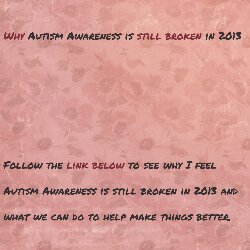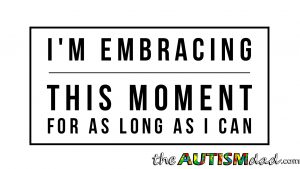A couple years ago, I wrote a story on Why Autism Awareness is Broken. This was actually one of my more popular articles and it garnered a lot of attention.
I wanted to follow up with my thoughts on how things are going with Autism Awareness in 2013 and what I think we could do to make the most out of this coming Autism Awareness Month.
I’m not claiming to be an expert and these opinions are that of my own. As a father to three boys with Autism, I have a vested interest in helping to make Autism Awareness work. These are a few of my thoughts.
For starters, I feel like nothing much has changed since I last wrote about this topic.

My thoughts still go to all the different factions that have formed within the Autism Community and how said factions seem to divide us. We have the classic vaccine division, where you either believe that vaccines save lives or ruin them. There are still people promoting acceptance and understanding (which isn’t a bad thing), as well as those that want to cure Autism.
We have parents of high functioning kids with Autism and parents of lower functioning kids with Autism that are sadly unaware of the challenges that are present in each others situations. There are judgements being hurled back and forth because neither side understands the other.
There are even Autistic adults that believe unless you haveAutism, you have no right to advocate, even for your own children. They feel this very, very….um….passionately.
At the same time, it seems that no one bothers to listen to what Adults with Autism have to say. Can we really blame them for being upset or feeling ignored?
We also have Autism organizations that have lost sight of what they were created to do. The month of April has become more about raising money than raising awareness. The whole “Light it up Blue” campaign is among the worst of them.
What does the color blue have to do with Autism? Nothing… It’s nothing more than selling or promoting a brand.
All we are doing is promoting one specific organization that many people with Autism don’t even support. That should probably tell us something.
Where does that money actually go? How many families or persons with Autism are directly assisted by this campaign?
Autism Awareness Month should not be used as a marketing campaign. Autism is not supposed to be a business.
Then of course we have the infamous Pink Letter(read my thoughts on that here). To say that this is disturbing is as big of an understatement as the letter itself is hateful and disgusting.
I could go on and on.
We are quick to assign blame to the public for not being Autism Aware and we fail to understand that Autism Awareness starts at home, within the Autism Community itself.
I just don’t see how we can, in good conscious, hold people outside the Autism Community accountable for things that we are guilty of ourselves. There is so much judgement and animosity within the Autism Community that we should be ashamed. We should know better.
There will always be someone that emails me after reading this, saying that I’m crazy, there’s no infighting or judgement within the Autism Community. It never fails. All I can say is that if you haven’t experienced this, I’m glad because no one else should have to.
Personally, I have been attacked countless times about my views on vaccines, the fact that I’m a neurotypical person advocating for those with Autism and because I say what I think and not just what people want to hear. It happens more often than you think and way more than it should. I’m even told by other Autism parents that there’s no reason that my kids couldn’t be mainstreamed because their child has Autism and he or she is mainstreamed and doing just fine.
I hear from parents all the time about their experiences that are similar to that of my own. Just because you haven’t seen or experienced this for yourself, doesn’t mean it’s not happening.
We spend so much time focusing on everyone else in the world being Autism Aware, we don’t see what’s going on at home.
It’s a forest for the tree’skinda thing.
Before we can expect the world to understand and accept those with Autism, we need to understand and accept as well. We need to remember that every person with Autism is unique and not a copy or clone of anyone else. In the same token, we have to be cognizant that every family raising a child with Autism can and very often will, have a profoundly different experience. Every family faces different challenges, some more than others.
Put more simply, just because our children share a diagnosis doesn’t mean that they are the same. We need to remember this.
We need to reach across our superficial differences and focus on our fundamental similarities. Despite our different beliefs, I truly believe that we all want what’s best for our kids. That means that we have something very, very important in common.
Simply because we don’t agree on what causes Autism doesn’t mean that we can’t present a unified front. Just because someone doesn’t have Autism themselves, shouldn’t mean that they can’t help or even be an advocate. I’ve always felt like the only prerequisite for advocating was a willingness to learn and the ability to care.
I have to believe that we are able to find some common ground. I have to believe that we can use that common ground to build a platform in which we can show the world all the different faces and voices of Autism..
We don’t need Autism organizations competing for dollars or popularity. We need them to help. We need them to step out of their offices and into the trenches. We need them to get in touch with what the Autism Community needs and here’s a crazy idea, how about actually working together.
It’s also of vital importance that we listen to what the adult Autistic community has to say. They can teach us so much, especially about our own children.
When it comes to situations like the Pink Letter, we have to maintain perspective. No matter what we do or how effective Autism Awareness is, there are always going to be hateful, ignorant people in the world. There’s nothing we can do about them. I’m angry at the words I read and my heart breaks for the family targeted. However, we can’t allow the type of person that would write something so vile to take away any of our power or control. By combating their hateful words with hateful words of our own, we’re allowing them to change us and not for the better.
Lastly, I truly believe that everyone should have a voice. Everyone’s experience with Autism is very likely to be different and while there may be similarities, no two stories will be exactly the same. We need everyone that has a story, to feel comfortable sharing their stories without fearing judgement or ridicule, especially from people who should understand.
If we want the world to be more Autism Aware, we need to lead by example.
This site is managed almost exclusively via WordPress for Android. Please forgive any typos as autocorrect HATES me. 😉
Visit the My Autism Help Forums
To reach me via email, please Contact Me




The issue of listening to adults with autism is an interesting one. Just which adults should we be listening to? I am one of many people involved with organizations working with adults with autism. We listen to the adults with autism who come to us for help. But adults with ASD are not a monolith; they don’t all need the same types of assistance or see things the same way. Sometimes the cry “they don’t listen to adults with autism!” really means “they didn’t do what I personally wanted”. For example, one day I argued online with an adult with ASD who thought every person with autism should aim for his/her own independent apartment. And I told her that MY adult son with ASD would hate that. She couldn’t see it; this was what SHE wanted, so surely every other adult with autism wanted the same thing! No, my adult son would far prefer a small community, sharing an apartment with someone else with ASD and sharing meals and free time with several others with ASD living in adjacent apartments. To me, it is about giving adults with autism choices…not expecting one organization, or one group of adults with ASD to speak for all of the rest.
I can easily understand why things look this way to you and to many others out there on the front lines, dealing with the challenges of your own kids. (My ‘kid’ with ASD is now 26.) There is a lot more coordination and talking among autism organizations than you may see…but much of that talking and coordination is done by phone, in person, by e-mail…and not necessarily on Facebook or blogs.
AliciaCross hudginsvicky rmagliozzi @Kristine McNeilly-Smith phreed1 brct brct @Michele Sterling @Marisol Romeyn
rmagliozzi very interesting point. I totally agree with you about the money being raised should go directly to help those living with Autism and their families..
If money is raised it needs to go straight into research and local resources to help those with autism now, providing needed therapies and medical treatments for those with autism who’s families cannot afford it. It does not need to go into the pocket of the CEO of “Autism Speaks” or to fund any light it up blue campaign. It must go to helping individuals with autism.
Divided or not, we need to figure out why there is an increase in autism and start addressing the causes.. I don’t think its wrong for us to advocate for our autistic children, especially those who are non verbal or have cognitive problems. In many cases they might not always be able to advocate for themselves. There is a huge variety of different types of autistic people. I know few autistic kids who share many of the bad PANDAS symptoms my child with autism has. I’ve known people who’s autistic kids were healthy enough and coordinated to play soccer with regular children and ride a bike without training wheels. that’s certainly not the case with many of our autistic children. I certainly also would never expect life with a severely autistic child to be the same as one with a child with aspergers or mild autism. It is completely different and the severe cases require round the clock care often.
brct well said. I absolutely agree.
Very well said. As a parent, you’ve put what I’d say into words. Perhaps it’s time we try to differentiate between the different ways autism affects individuals. It isn’t working that we tend to talk about autism as if it were one thing. It has such a broad spectrum, nobody can advocate for all people with autism. A adult with autism who can self advocate doesn’t have the same experience as my son who is non-verbal. I could never speak for them. I think parents do need to accept their children, but as with any child, they also want to their children to grow to their fullest potential. That’s our job, autism or no.
@Kristine McNeilly-Smith Thank you very much. 🙂
Well said
AliciaCross hudginsvicky I agree with both of you. You have to experience Autism first hand to truly understand it. Mixed diagnoses do make everything so much more complicated.
Thank you for writing this!
You are right, I think one of the biggest issue in the Autism world is the variability of each child. I have a BA in Psychology and a MA in Psychology with a specialty in Child and Adolescent Development which I focus on Autism. Unfortunately much of my learning did not line up with my experiences as a mother of 2 ASD boys. I think that it is impossible to learn about Autism for a book or an article, you need to experience it on a one on one basis. It leads my to all the mental health professionals that are suppose to help but get or wont broaden their understanding of the ASD. I have been through several therapy and med drs and none of them would treat the ASD, I was told that I was the problem and I was a bad mother and all he issues were environmental, BS. I also have the same problem with the school system they will not say my children have ASD even with multiple evaluations supporting it, so there is no help and no understand just a lot of not learning to function or learn to help improve their future.
Another problem in the PCP drs, research supports that the ealry the treatments start the better but what if the dr will not say your child needs help. True story, my oldest was not dx with ASD until 12, only after I got his younger brother dx. I had to go around the PCP dr and put him on the year long waiting list for dx and by the time the dr realized there was an issue his name was up on the list.
Finally I think there needs to be more support among ASD parents, like you said. I was in a support group and left because the other parents were too judgmental and pushing their opinions on others. Why must there be arguing among us we are all in the same boat, maybe of different side but the same boat none the less.
I also think the complexity of the mixed dx are too hard to understand, my research has shown that ASD is in only 1 to 2% of the pop and adding Bipolar to that there are only 1 to 2% of those children then add an attachment issue and or ADHD, that is even less. All these issues play off one another and make it VERY hard to treat and even understand because something that worked one day will not work the next (true story), which I am sure you know.
Very well said. Two thumbs up. I agree with the division between “autism factions”. And I think that many of us work hard for so long trying to mold our children into the most nt possible, in reality we need to accept them and their autism. Doesn’t stop me from finding the “why”, finding that only can help manage symptoms.
It’s hard for me to muster up any interest in the autism community at large, or their politics, nor the medical community and in particular, most of the psychiatric community. That’s probably because my experience with my son’s autism has been a lonely, frightening, and confusing journey. I have learned to distrust the “professionals” who are usually more concerned with their own personal interests than doing what is right.
We are lost in limbo, between the autism “community” which feels that a diagnosis of “high-functioning” or Asperger’s is the same as an “all-clear” signal…and the “normal” population, folks who are marginally polite but still reject us (my son) by not fully accepting him, because he is quirky and odd and rigid and a thousand other things. I learned most of all, that autism never ends, but is one hurdle after the next, and just at the moment when you think things are going well, the rug gets pulled out from under you. I often feel adrift at sea, just him and me, without a compass or map.
Yes, I have a lot of anger and resentment, but most of it is directed toward a society which is unable to accept, or embrace human differences. All I really know is that I’ve done the best I possibly could for the past almost 18 years, and I am no surer now of his future than I was in the beginning. If I had one wish it would be to throw out all the labels that create division in this community that you speak of, because autism is a disease/condition that is only different by degrees and each family struggles in their own heartbreaking way. Anyone who says their family member or entire family is doing just fine in the public arena is either deep in denial, or hasn’t hit the wall yet. but they will and woe to them.